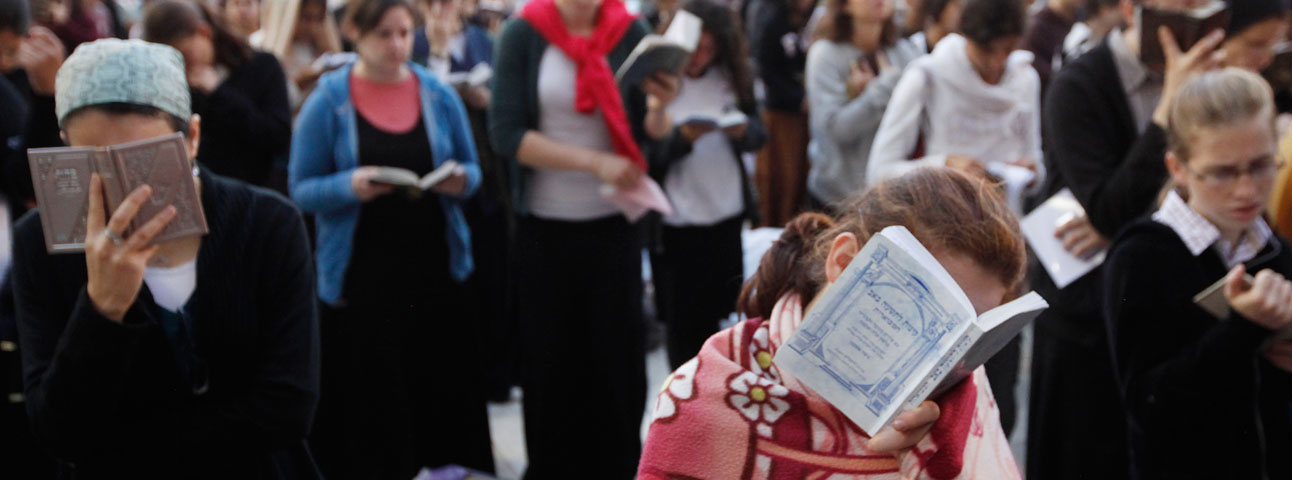Tisha B'Av: What's Worth Mourning For?
Strengthening the norms that are founded on our shared national traditions can help fortify our shared national identity - but any attempt to impose religious norms on a public when the majority does not identify with them will only lead to division and hate, says Yair Sheleg as we mark the mourning day of Tisha BÁv.

Flash 90
There are three evenings a year on which all “places of entertainment” (cinemas, theaters, cafés, etc.) in Israel are shut down by law: the eve of Holocaust Remembrance Day, the eve of Remembrance Day for Fallen Soldiers and the eve of Tisha Be’av. But while there is broad national consensus about the first two, and no one challenges the law in those cases, when it comes to Tisha Be’av, the enforced mourning in the public space is viewed as another example of religious coercion, and does not really resonate with secular Israelis.
This sentiment is understandable. Most of the Jewish population in Israel – to a lesser or greater degree among various groups – as well as most non-Jewish groups, has suffered losses during Israel’s wars and in terrorist attacks. Not all Jewish groups were victims of the Holocaust, and certainly not all to the same degree, but the sense of mourning at this terrible loss is shared by all. However, most secular Jews will certainly ask themselves, “What connection do we have with a day of mourning for the destruction of the Temple, which happened almost 2,000 years ago – and which, in any case, is about mourning for an institution which has no meaning for us?”
This sentiment is understandable, but misguided. The two destructions of the Temple in Jerusalem signify not only the destruction of an important religious institution, but also the climax of an excruciating national destruction. If we were able to show Israeli viewers pictures of the fall of the first and second temples, just as we have footage of the Holocaust, we would not only see the temple building going up in flames, but also thousands of bodies strewn about the city’s streets, and even parents eating the flesh of their children, as reported in the Book of Lamentations. It is likely that such images would justify a day of mourning even in the eyes of the secular viewer; and if not, it is difficult to see how Holocaust Remembrance Day will be maintained 2,000 years into the future.
Moreover, that destruction was not just a one-off event; rather, it marked the beginning of the long Jewish exile, during which the Jewish people endured all of its other trials and disasters, including the Holocaust itself. This was why prime minister Menachem Begin, after gaining power in 1977, sought to move Holocaust Remembrance Day to the Tisha Be’av. His proposal carried great historical logic, creating an authentic link between the destruction in ancient times and the Holocaust, and would have added the religious elements of fasting and lamentations to Holocaust Remembrance Day. However, it would also have stripped the Holocaust of some of its uniqueness, and transformed it into just another event in the endless chain of pogroms and slaughtering suffered by the Jewish people in exile.
No less importantly, we should take advantage of Tisha Be’av to consider the significance of the destruction of the Temple and the exile in an age in which we again have Jewish sovereignty in our own land. The wonder of the Jewish people’s survival over two millennia of exile tends to lead to one of two problematic conclusions: First, that Jewish survival is a divine miracle, and thus today – Jews are free to act in a way that is oblivious to any risks involved, because we are promised that “there will not be a third destruction.” And the second, more rational conclusion is that since Jewish survival in exile was safeguarded by strict observance of religious commandments, we must make certain that religious identity will be the main component of our national identity under sovereign rule as well.
THESE ARE both seductive ideas, but they are false and even dangerous. Jewish survival in the Diaspora was indeed a wonder, perhaps a unique occurrence in human history, but it was not a miracle; rather, it can be explained rationally. The explanation is indeed linked to the fact that religious law (halacha) preserved a separatist Jewish identity that prevented assimilation (though it did also fan the flames of antisemitism). But it would be a mistake to conclude that under the current conditions of sovereignty, when most Jewish Israelis are not religiously observant, the continuity of Jewish existence can only be ensured by the religious minority forcing its values and way of life on the majority.
As many politicians and generals have discovered (usually, unfortunately, only post factum), what may be a factor in achieving victory in one type of battle can turn out to be a factor for failure in another. The same is true here: Strengthening the norms that are founded on our shared national traditions (whose roots are indeed religious) is a worthwhile goal, and can help fortify our shared national identity. But any attempt to impose religious norms on a public when the majority does not identify with them will only lead to division and hate, and in the end, will weaken national unity rather than strengthening it. The Jewish paradox is that attempts to duplicate the circumstances of the success of Jewish survival in exile within the sovereign Jewish state run the risk of (unwittingly) returning the Jews into exile, or at the very least, of causing the loss of Jewish sovereignty.
The article was published in the Jerusalem Post.
